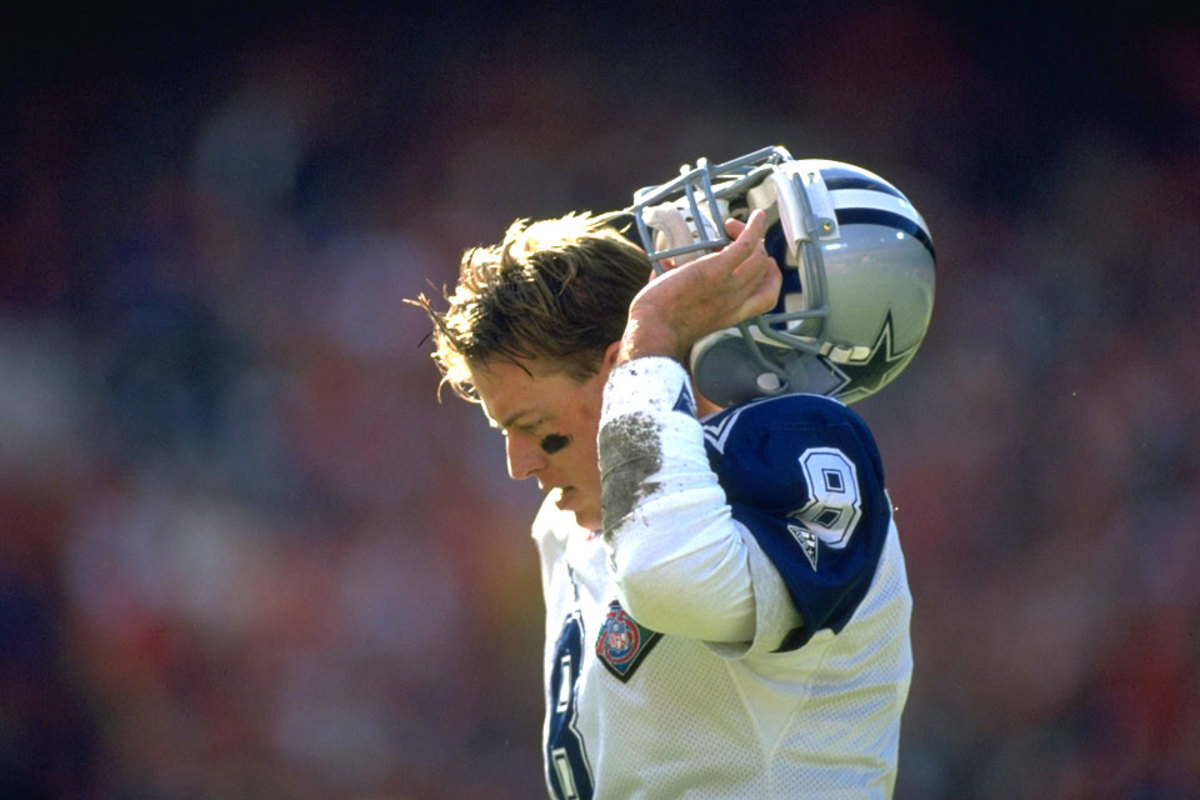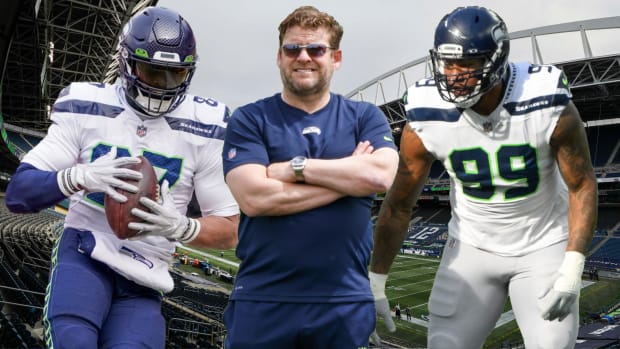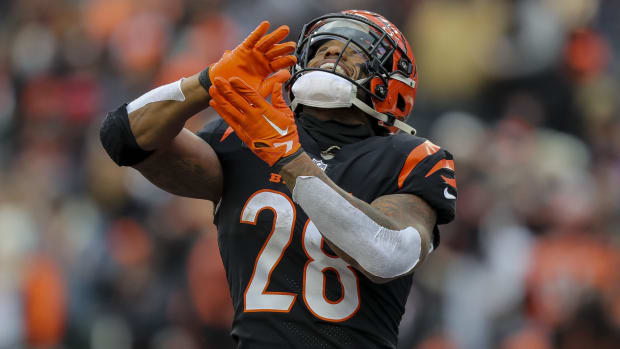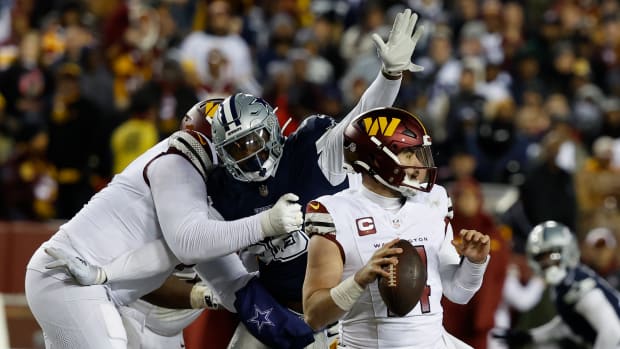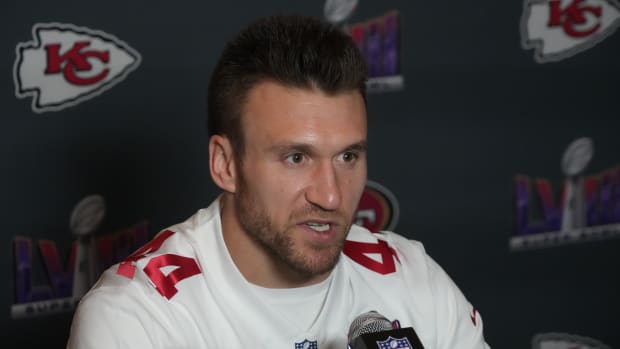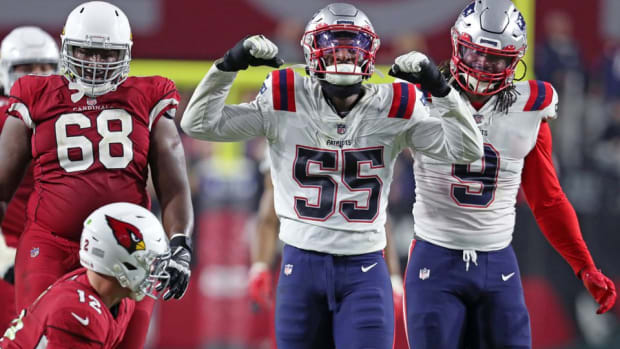Troy Aikman on Concussions, Borland and Broadcasting
Chris Borland is half Troy Aikman’s age, and when I recently asked Aikman if he thought about what his health would be like at 48 when he was Borland’s age (24), he answered as I expected.
He said it was inconceivable that he would think that far ahead.
Aikman said he suffered two “severe” concussions during his 12-year career as a quarterback for the Cowboys, though the overall number of concussions he had, he surmised, was likely between six and eight.
“I don’t know what it was, and if that is all it was, and I put ‘all’ in quotation marks—that is not a lot in terms of head trauma relative to other positions,” says Aikman, now the top NFL analyst for Fox Sports. “I use Daryl Johnston as an example. He played fullback [for Dallas], and every single play he was hitting someone with his head. These guys are the ones to me who are and were more susceptible. What we have seen is how offensive and defensive lineman facing sub-concussive hits that occur over and over repetitively are more at risk than the big blows.”
“When I hear someone say I don’t want someone playing the game, even though I gained a great deal from this game, I understand it. I know why people have reservations. I try to put that in its proper context. I don’t feel I’m a shill for the game or for Fox. I am paid to give my opinion, and sometimes my opinion is consistent with the messaging of the NFL and sometimes it is not. I know there have been times I’ve said things the NFL office has not liked, but I think for me to be a voice that is respected, I have to be as honest as I can be. And I will say Fox has never come to me and asked me not to say something.”
“With the rule changes and safety focus, defensive players have learned where the target areas are. Quarterbacks and receivers are not being hit with the severity they once were.”
I was interested in Aikman’s reaction to Borland’s decision to retire after just one NFL season out of concern, in part, for the effects of repetitive head trauma. Aikman said he did not think Borland’s decision would serve as a tipping point for mass NFL or college defections from football. (Nor do I.) But he is very interested in whether a decrease in concussions at the NFL level would impact grass-roots level participation in the game.
Aikman says he suffered two “severe” concussions and at least a half-dozen more during his career. (Peter Read Miller/Sports Illustrated)
“I was like most of the current and former players who commented on [Borland]: It is rare that an athlete walks away from the game when he can still play,” Aikman says. “A lot of guys talk about it, but when it comes to making the decision, most players are pushed out. So for a guy who came on and had a terrific rookie season and a promising career ahead of him, to walk away, I guess it’s admirable that he is looking at his long-term health. Because we all talk about it.
“At 24 I think I had one head injury,” Aikman continues. “When I was playing and for those generations who played before me, the thought was, ‘Okay, you are playing a game that you love, you are compensated well for it, and when you get out, you may have a slight limp or some fingers that don't bend properly.’ With head injuries, that is a whole different animal. Talking about getting out of the game and then not be able to have your memory or your facilities, I think that has put a little different spin on it for the current players who have to weigh the data the research they have, all of which is more than we had before.”
Aikman said he did not retire after the 2000 season because of the concussions. He said he stepped away from the NFL because of chronic back problems. When his career ended there was no research on chronic traumatic encephalopathy (CTE) as there is now for players to evaluate. Aikman said in college he would take a significant hit once every two or three games, and that number amped up in the pros.
• “IRON MAN” LAB: How the U.S. Army’s advanced researchers are trying to create a safer NFL
“These guys were grown men with a lot of years under their belt,” Aikman says. “But with the rule changes and safety focus, the quarterbacks are not even close to being hit as we were. I think the defensive players have learned where the target areas are, and quarterbacks and receivers are not being hit with the severity they once were.”
The NFLu2019s Taboo TV Topic
With billions of dollars in the balance, the league’s broadcast partners walk a tightrope when reporting on head injuries. As awareness grows, it’s a topic that cannot be ignored. But are audiences developing concussion fatigue? FULL STORY
Two summers ago Aikman met with
, a cognitive neuroscientist who serves as the CEO of Center for BrainHealth at the University of Texas at Dallas. Aikman was part of the facility’s board at the time, and he was looking to further educate himself on the center’s work. After the meeting concluded, Aikman told Chapman that he wanted to go through the center’s testing to evaluate his own brain. “I wasn’t suffering and had no reason to think someone was going on, but this seemed like a reputable place,” Aikman says.
The testing took three to four hours; the findings came back a few weeks later. Aikman tested well. “It certainly gave me some peace of mind,” Aikman says. “But the reason I have never been concerned is that the job that I have with Fox is a mental exercise—recalling numbers and names and things of that nature. I am able to do that pretty readily. I do think broadcasting with Fox keeps my mind active, and I think it helps.”
Aikman, who has two daughters, wanted to clear up one thing. It’s been reported that he would not put a son in football if he had one, but that’s not entirely accurate. Here is how he feels, and it gives insight into how many parents are thinking these days.
“I don’t have a 10-year-old son,” Aikman says. “If I did, I would not tell him he could not play football. But I don’t think I would encourage him to play football. Right now, with my girls, I don’t push them in any one direction. But I would say, ‘Hey, I think soccer would be good for you because I think kids learn a lot and it’s good to be active.’ With football I don’t think I would be encouraging my son to play. If he wanted to, I would say great, you can do it. But I don’t think I would be encouraging him as I would some other sports.”
• FOOTBALL WON’T BE THE SAME: Greg Bedard on the decisions a father must make
Follow The MMQB on Facebook, Twitter and Instagram.
[widget widget_name="SI Newsletter Widget”]
































